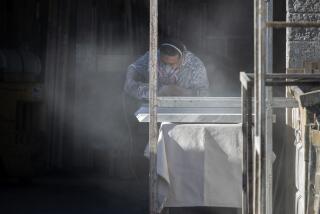FDA targeted maker of scope-cleaning machines long before superbug outbreaks
Federal regulators halted manufacturing and sales at a Pennsylvania company in 2012 that made the scope-washing machines used at UCLA and two other hospitals with recent superbug outbreaks.
The washers — known as automated endoscope reprocessors — were produced by Custom Ultrasonics.
Despite the regulatory action, the company’s machines remain in use by more than 1,000 U.S. hospitals and clinics to clean reusable medical instruments.
But The Times has learned that in September 2012 the Food and Drug Administration ordered Custom to cease operations, and the company is still barred from manufacturing or shipping new products. The company continues to service its washers in the field.
“It’s very disturbing if a hospital using this equipment might not know about all of its potential problems,” said Lisa McGiffert, director of Consumers Union’s Safe Patient Project. “These are real safety concerns and the public should know.”
The 2012 FDA order stemmed, in part, from Custom Ultrasonics’ failure at the time to obtain government clearance for its System 83 unit featuring a significant upgrade to the machine’s operating system.
Inspection reports obtained by The Times show that FDA officials had concerns about computer-related problems that could interrupt the cleaning cycle on Custom equipment and possibly compromise patient safety.
Custom “failed to fully identify the health risk to the patient population if current products in distribution with potentially nonconforming computer hardware components should fail,” an FDA investigator wrote in January 2012.
During a more recent inspection in November 2014, FDA officials said management “has not ensured that an adequate and effective quality system has been fully implemented and maintained at all levels of the organization.”
This information hasn’t been reported until now, and the full details aren’t available on the FDA website. The Times obtained documents from a Freedom of Information Act request.
The new revelations might raise more questions about the FDA’s oversight of device makers and the level of information it shares with medical providers and patients.
Federal lawmakers and the families of infected patients have criticized the FDA for failing to alert the public sooner about the well-documented dangers of tainted duodenoscopes spreading deadly bacteria among patients.
An FDA spokeswoman didn’t comment on why information wasn’t disclosed publicly and wouldn’t provide the September 2012 notice issued to Custom.
“Presently, Custom Ultrasonics is prohibited from manufacturing, packing, labeling, or distributing any devices until the firm receives written notification from FDA that it appears to be in compliance” with federal regulations, said FDA spokeswoman Jennifer Corbett Dooren.
Custom said it stands by the quality of its products and emphasized that customers are aware of its regulatory troubles.
Robert Blanchard, Custom’s director of sales and product management, said the Ivyland, Pa., company is working with the FDA to reopen and resume manufacturing.
“There has never been a problem with the product over 30 years,” he said. “The FDA was not happy with the documentation of the manufacturing process and quality system. All of our customers know the situation we are dealing with.”
These sophisticated washing machines play a central role at many U.S. hospitals, which rely on them to quickly disinfect endoscopes for the next patient and to keep turnaround times short at busy medical facilities.
Health officials have focused much of their attention so far on a design flaw in the duodenoscopes that allows germs to become trapped at the end of the device and hard to remove even when following the manufacturers’ cleaning instructions.
Custom machines can cost $30,000 to $50,000 and typically take about 30 minutes to wash scopes with disinfectant.
The FDA has sounded warnings about Custom in the past. In 2007, it announced the company had signed a consent decree in federal court because its “actions posed a potential public health hazard because endoscopes that are not properly cleaned and disinfected can be a source of transmission of pathogens between patients.”
Regulators later disclosed recalls involving Custom products in 2008 and 2013. In the most recent action, the agency said customers using 118 units were notified and the recall was ended in June 2014.
But the FDA said it allowed Custom equipment to remain in use while fixes were made “following an evaluation of potential risks to patients and the public health associated with the units’ removal.”
UCLA uses Custom washers for its duodenoscopes and called in the company as part of its outbreak investigation earlier this year.
The university found “there was no functional issue with the units” and the FDA recall in 2013 “did not impact clinical practice.”
After discovering superbug infections in late 2012, the University of Pittsburgh Medical Center switched from a Custom washer to one made by Olympus Corp., a scope manufacturer.
But the hospital found that neither the Custom nor Olympus machines were effective in eradicating bacteria from scopes.
As a result, the Pittsburgh hospital added gas sterilization to enhance patient safety, and UCLA did the same.
As part of its response to the hospital outbreaks, the FDA has sought test data from Custom and other manufacturers of scope-cleaning equipment to ensure their methods actually work on duodenoscopes.
The agency said it has received 152 reports of possible patient infections and device contamination related to automated endoscope reprocessors from 1992 to March 2015.
Twitter: @chadterhune
More to Read
Inside the business of entertainment
The Wide Shot brings you news, analysis and insights on everything from streaming wars to production — and what it all means for the future.
You may occasionally receive promotional content from the Los Angeles Times.











